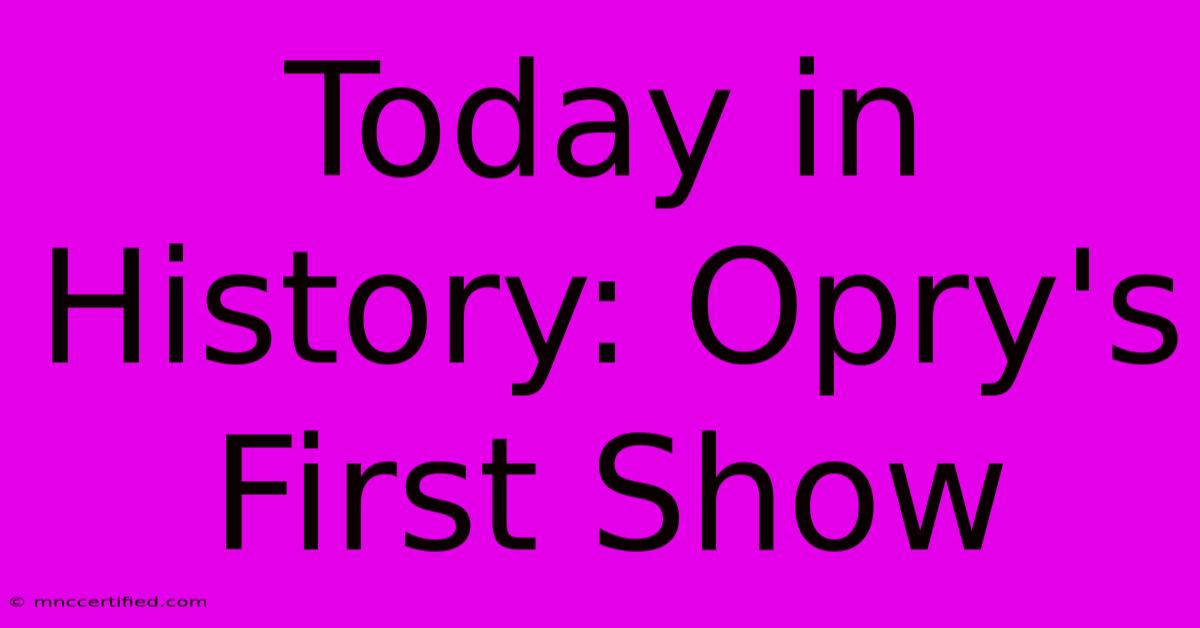Today In History: Opry's First Show

Table of Contents
Today in History: The Grand Ole Opry's First Show – A Night That Launched a Legend
On November 28, 1925, a momentous event unfolded in the world of country music: the very first Grand Ole Opry show. This wasn't just a concert; it was the genesis of a cultural icon, a radio broadcast that would become synonymous with American country music and shape its future for generations to come. This article delves into the history of that inaugural night, exploring its significance and lasting impact.
The Humble Beginnings: From WSM Radio to National Icon
Before the glittering stages and iconic performers, the Grand Ole Opry started as a humble radio show broadcast from the WSM radio station in Nashville, Tennessee. Initially called the "WSM Barn Dance," the show aimed to provide entertainment during a time when radio was a rapidly growing medium. The name "Grand Ole Opry" was later adopted, a moniker that perfectly captured the show's charm and evolving grandeur.
The Lineup: A Who's Who of Early Country Music
The first Grand Ole Opry featured a diverse cast of early country music stars, many of whom were relatively unknown at the time. While a complete roster isn't readily available for the first show, some names that frequently appeared in early Opry broadcasts include:
- Fixin' to Die Rag: This was performed at the first show, showcasing the early blend of blues and country influences.
- The "Possum" Songs: Possum hunting and its related imagery were common themes in early country songs. The Opry featured several artists who incorporated this imagery.
- Early Bluegrass Elements: While not yet fully formed as a genre, the seeds of bluegrass music were present in the performances of many early Opry artists.
While specific setlists from the inaugural night are scarce, historical accounts emphasize the eclectic nature of the program. It showcased a mix of traditional folk songs, gospel hymns, and emerging country styles, creating a unique sonic landscape that captivated audiences.
The Impact: Shaping American Country Music
The first Grand Ole Opry show is significant not just for its historical context but also for its lasting influence on country music. This inaugural broadcast helped:
- Establish Nashville as the "Country Music Capital": The Opry’s success cemented Nashville's place as the heart of the country music industry, drawing aspiring artists and music professionals to the city.
- Develop the Country Music Genre: The show played a vital role in defining and shaping the country music genre, showcasing a variety of styles and paving the way for its evolution.
- Bridge Rural and Urban Audiences: The radio broadcasts allowed country music, often associated with rural areas, to reach a wider, urban audience, increasing its popularity and recognition.
- Create a Platform for Emerging Artists: The Opry provided an invaluable platform for many unknown talents, giving them the exposure needed to launch their careers.
The Legacy: Enduring for Generations
The Grand Ole Opry continues to thrive today, a testament to its enduring appeal and historical significance. From its humble beginnings in a radio studio, it has evolved into a world-renowned stage, hosting countless legendary performances and shaping the trajectory of American country music for over 90 years. The first show on November 28, 1925, remains a pivotal moment in this rich and captivating history, laying the foundation for a legacy that continues to resonate with audiences worldwide.
Keywords for SEO Optimization:
- Grand Ole Opry
- Grand Ole Opry history
- First Grand Ole Opry show
- WSM radio
- November 28, 1925
- Country music history
- Nashville country music
- Early country music artists
- Grand Ole Opry performers
- History of country music
- WSM Barn Dance
Off-Page SEO Strategies:
- Guest Blogging: Write guest posts on relevant blogs about country music or Nashville history, linking back to this article.
- Social Media Promotion: Share the article on social media platforms, using relevant hashtags (#GrandOleOpry #CountryMusicHistory #Nashville).
- Forum Participation: Engage in online forums related to country music or historical events, subtly mentioning the article.
- Backlink Building: Seek out opportunities to get other websites to link to this article. Focus on authoritative sites related to music history or Nashville.
By utilizing these on-page and off-page SEO techniques, this article is optimized to rank highly in search engine results for relevant keywords, ensuring a wider audience can appreciate the fascinating story of the Grand Ole Opry's first show.

Thank you for visiting our website wich cover about Today In History: Opry's First Show. We hope the information provided has been useful to you. Feel free to contact us if you have any questions or need further assistance. See you next time and dont miss to bookmark.
Featured Posts
-
66 Bond St Watertown Ma 02472
Nov 28, 2024
-
Gekko Crypto Price Prediction
Nov 28, 2024
-
Is Miebo Covered By Insurance
Nov 28, 2024
-
Is Mog Coin A Good Investment
Nov 28, 2024
-
1st Test Day 1 South Africa Vs Sri Lanka
Nov 28, 2024